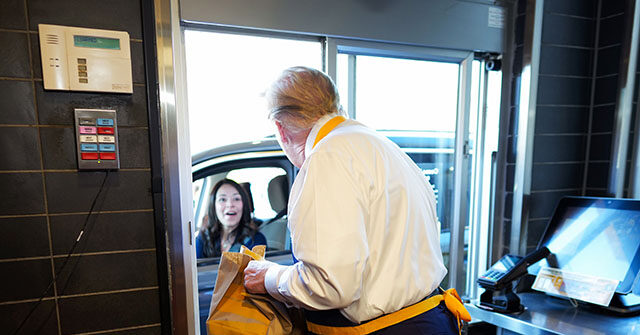Last Sunday, a unique encounter unfolded at a Pennsylvania McDonald’s when former President Donald Trump, temporarily working as a fry cook and drive-thru operator, served Nayara Andrejczyk, a Brazilian immigrant. Their brief but poignant exchange went viral, as Andrejczyk took the opportunity to appeal directly to Trump concerning her concerns about the future of the United States. “Mr. President, please don’t let the United States become Brazil,” she implored, referencing her native country’s struggles with corruption. Trump’s reassuring response was that he and his team would work hard to “make it better than ever.” This interaction not only resonated with the immediate audience but also sparked broader conversations about national identity, immigration, and political accountability.
Andrejczyk elaborated on her heartfelt plea during an interview with Fox News, where she revealed her personal reasons for wanting to prevent America from mirroring Brazil’s current political landscape. Her family experienced firsthand the repercussions of government corruption, which led her parents to migrate to the U.S. nearly thirty years ago after her mother lost a once-thriving business due to systemic failures. She emphasized her deep appreciation for America, expressing fears that the corruption plaguing Brazil could seep into American politics if not vigilantly guarded against. This narrative echoes a sentiment shared by many immigrants who come seeking freedom and opportunity, highlighting the importance of maintaining accountability in leadership.
The day took on a unique significance as it coincided with Trump’s reactions to Vice President Kamala Harris’s previous assertion about her own experience working at McDonald’s—a claim the fast-food chain itself could not substantiate. Observing this, Trump decided to take a hands-on approach, engaging the public in a McDonald’s setting to emphasize his connection to the working-class experience. This playful act was not merely a publicity stunt but a strategic move to resonate with voters who may feel disconnected from elite political circles. It also underscored McDonald’s as a cultural touchpoint in American life, bridging connections across diverse backgrounds in a relatable setting.
As Andrejczyk reflected on her encounter with Trump, she noted his genuine demeanor during their brief exchange. She recounted how he made an effort to connect not only with her but also with her children, leaving a lasting impression on them. This emotional connection underscored the impact that personal moments like this can have in politics. Children’s reactions can significantly influence public sentiment, and Andrejczyk mentioned how her kids were in disbelief over shaking Trump’s hand, symbolizing an interaction that transcends traditional political engagements. It painted Trump as a more approachable figure, at least in that setting, and contributed positively to his image as he campaigned for a return to office.
Bolsonaro, the former Brazilian President, also recognized Andrejczyk’s comments, offering his own congratulations on social media and emphasizing shared struggles. The connection paved by her expression of worry for the U.S. reinforces the global nature of political dialogue, especially among those who have a stake in both nations. The transnational sentiment reflects a complex intersection of personal experience and national discourse, illustrating how individual stories can have broader implications in political spheres. It symbolizes not just a call for action and vigilance but represents the interconnectedness of political issues facing both the U.S. and Brazil.
Ultimately, Trump’s day at McDonald’s served multiple purposes: a playful nod to both his past and Harris’s claims, a platform for expressing deep personal concerns about corruption, and a testament to the power of face-to-face interactions in politics. The event highlighted how grassroots encounters can shape larger narratives and public opinions. As the political landscape continues to evolve, the importance of personal stories like Andrejczyk’s will remain pivotal in shaping perceptions of political figures, influencing voters, and fostering discussions around accountability in governance. It raises essential questions about immigrant experiences in America, the responsibilities of leaders, and the kind of country Americans wish to cultivate in the years to come.

